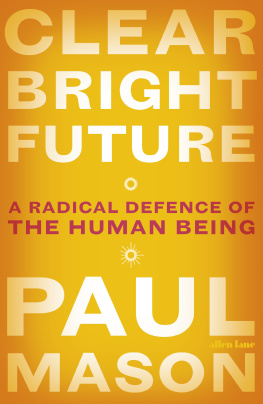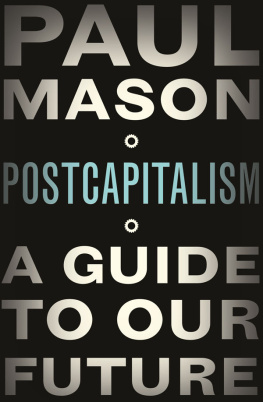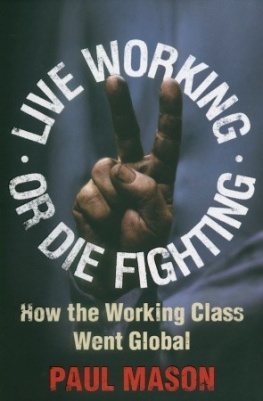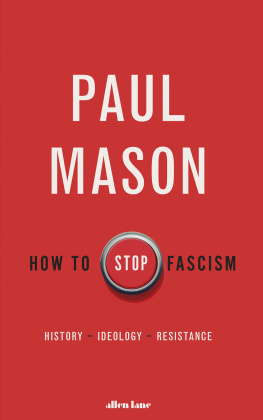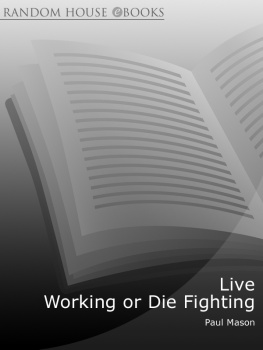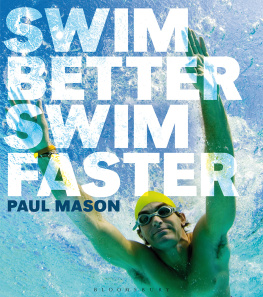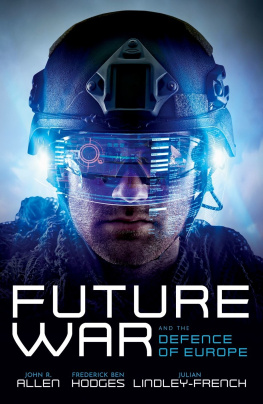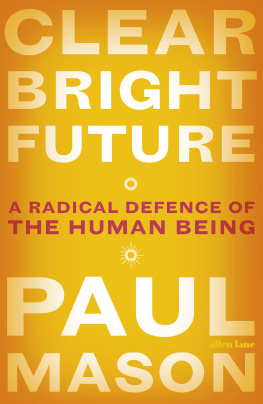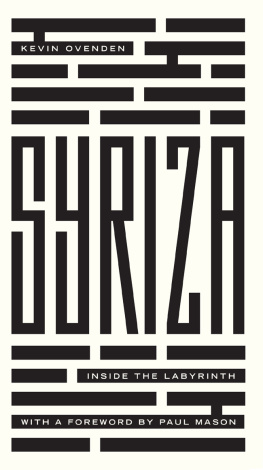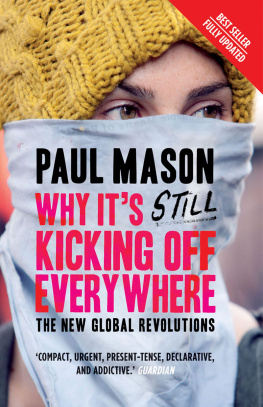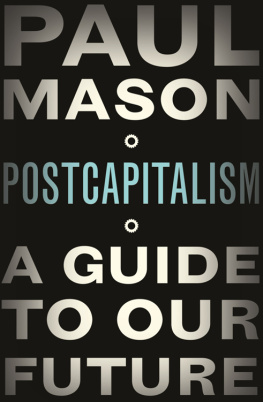Paul Mason - Clear Bright Future: A Radical Defence of the Human Being
Here you can read online Paul Mason - Clear Bright Future: A Radical Defence of the Human Being full text of the book (entire story) in english for free. Download pdf and epub, get meaning, cover and reviews about this ebook. year: 0, genre: Politics. Description of the work, (preface) as well as reviews are available. Best literature library LitArk.com created for fans of good reading and offers a wide selection of genres:
Romance novel
Science fiction
Adventure
Detective
Science
History
Home and family
Prose
Art
Politics
Computer
Non-fiction
Religion
Business
Children
Humor
Choose a favorite category and find really read worthwhile books. Enjoy immersion in the world of imagination, feel the emotions of the characters or learn something new for yourself, make an fascinating discovery.
- Book:Clear Bright Future: A Radical Defence of the Human Being
- Author:
- Genre:
- Year:0
- Rating:4 / 5
- Favourites:Add to favourites
- Your mark:
- 80
- 1
- 2
- 3
- 4
- 5
Clear Bright Future: A Radical Defence of the Human Being: summary, description and annotation
We offer to read an annotation, description, summary or preface (depends on what the author of the book "Clear Bright Future: A Radical Defence of the Human Being" wrote himself). If you haven't found the necessary information about the book — write in the comments, we will try to find it.
Clear Bright Future: A Radical Defence of the Human Being — read online for free the complete book (whole text) full work
Below is the text of the book, divided by pages. System saving the place of the last page read, allows you to conveniently read the book "Clear Bright Future: A Radical Defence of the Human Being" online for free, without having to search again every time where you left off. Put a bookmark, and you can go to the page where you finished reading at any time.
Font size:
Interval:
Bookmark:

ALLEN LANE
UK | USA | Canada | Ireland | Australia
India | New Zealand | South Africa
Allen Lane is part of the Penguin Random House group of companies whose addresses can be found at global.penguinrandomhouse.com

First published 2019
Copyright Paul Mason, 2019
The moral right of the author has been asserted
ISBN: 978-0-241-32011-2
This ebook is copyright material and must not be copied, reproduced, transferred, distributed, leased, licensed or publicly performed or used in any way except as specifically permitted in writing by the publishers, as allowed under the terms and conditions under which it was purchased or as strictly permitted by applicable copyright law. Any unauthorized distribution or use of this text may be a direct infringement of the authors and publishers rights and those responsible may be liable in law accordingly.
To the memory of my mother, Julia Lewis (19352017)
The experience of my life has not only not destroyed my faith in the clear, bright future of mankind, but on the contrary has given it an indestructible temper.
Leon Trotsky
. Deutscher, Isaac, The Prophet Outcast: Trotsky, 19291940, London, 2003, p. 399
By the end of reading this book I want you to make a choice. Will you accept the machine control of human beings, or resist it? And if the answer is resist, on what basis will you defend the rights of humans against the logic of machines?
In the twenty-first century, the human race faces a new problem. Thanks to information technology, vast asymmetries of knowledge have opened up creating vast asymmetries of power. Through the screens of our smart devices, both corporations and governments are becoming adept at exerting control over us via algorithms: they know what were doing, what were thinking, can predict our next moves and influence our behaviour. We, meanwhile, dont even have the right to know that any of this is going on.
And thats just the nightmare of the present. In the future, as artificial intelligence develops, it will become very easy for us to lose control of information machines altogether.
An algorithm is simply the instructions for solving a problem, devised by a human and written down. For example: when I present my passport, border control knows that, if my fingerprints match the ones stored on file, they should let me through; if they dont, I get detained for further questioning.
A computer program is an algorithm running without human intervention. In one sense it is just the latest achievement in a long process of automation. For the past 200 years one of our most successful strategies has been to move workers to the side of an industrial process; to make them observers rather than controllers, giving machines temporary and limited autonomy. What we do with computers and information networks is only an extension of what we did with windmills, cotton-spinning machines and the combustion engine. But once machines can give themselves instructions, the risk is that humanity steps to the side permanently, surrendering control.
Millions of people have become alert to the dangers of algorithmic control. But they assume it is a problem for an ethics committee, a tech conference, a science magazine or for the next generation to solve. In fact, it is intimately connected to the urgent economic, political and moral crises we are living through now.
Heres why
Suppose I told you there was a machine that could run the country better than the government, think more logically than any single human and run autonomously? Suppose I asked you to hand control of all the important decisions in your life to that machine? Suppose I said you would be happier if you changed your behaviour to anticipate what the machine decides? I hope you would scorn the whole idea.
But try substituting the word market for the machine. For three decades, millions of people have allowed market forces to run their lives, shape their behaviour and overrule their democratic rights. There is even a religion dedicated to worshipping this machines power and control: its called economics.
By elevating the market to the status of an autonomous, superhuman spirit guide during the past thirty years we have, potentially, prepared ourselves to accept machine control sometime during the next hundred years.
During the free-market era we learned to celebrate the subjection of human beings to market forces. We treated concepts like citizenship, morality and agency (the power to act) as if they were irrelevant to the workings of the world, which was now run only by consumer choice and financial engineering.
Now, however, the free-market system has imploded. The logic of selfishness, hierarchy and consumerism no longer works. As a result, the religion of the market has given way to older gods: racism, nationalism, misogyny and the idolization of powerful thieves.
As we approach the 2020s, an alliance of ethnic nationalists, woman-haters and authoritarian political leaders are tearing the world order to shreds. What unites them is their disdain for universal human rights and their fear of freedom. They love the idea of machine control and, if we let them, they will deploy it aggressively to keep themselves rich, powerful and unaccountable.
It is not too late to stem the chaos and disorder, to stop the attempt to impose new biological hierarchies based on race, gender and nationality, and to refuse machine control. But the arguments for surrendering to them are all around us.
The idea that humanity is already over is deeply embedded in modern thought, from the alt-right to the academic left. No matter how much you, personally, are trying to live by human values, the consensus is from Silicon Valley to the HQ of the Chinese Communist Party that human values have no foundation; that there is no such thing as human nature, no logical basis to privilege humans over all machines, no rationale for universal human rights.
With hindsight, free-market ideology looks like the gateway drug for a more pervasive anti-humanism. And were about to find out just how damaging this harder drug can be.
Compete and acquire was the first commandment of the free-market religion. In the era of de-globalization and right-wing nationalism it will become: compete, acquire, lie, control and kill. If we dont place the new technology of intelligent machines under human control, and programme them to achieve human values, the values they will be designed around are those of Putin, Trump and Xi Jin Ping.
So I have written this book as an act of defiance. When youve read it, I hope you will begin to make acts of defiance yourself. They can range from bringing down dictators, to setting up human-centred projects in your neighbourhood, to simply defying machine logic in your daily life.
To resist effectively we need a theory of human nature that can survive in conflict with free-market economics, machine worship and the anti-humanism of the academic left.
We need, in short, a radical defence of the human being.

Font size:
Interval:
Bookmark:
Similar books «Clear Bright Future: A Radical Defence of the Human Being»
Look at similar books to Clear Bright Future: A Radical Defence of the Human Being. We have selected literature similar in name and meaning in the hope of providing readers with more options to find new, interesting, not yet read works.
Discussion, reviews of the book Clear Bright Future: A Radical Defence of the Human Being and just readers' own opinions. Leave your comments, write what you think about the work, its meaning or the main characters. Specify what exactly you liked and what you didn't like, and why you think so.

